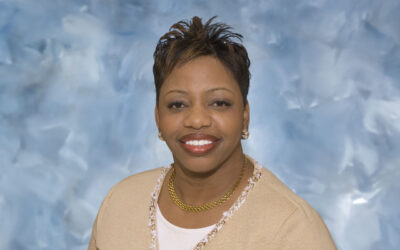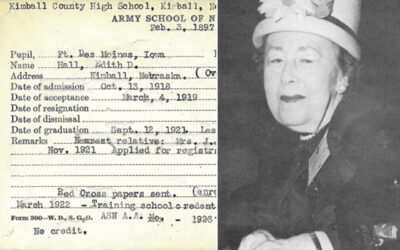For 10 years, Sara Kucharski, RN, BSN, has been helping at-risk mothers deliver healthier babies. Even more impressive, she’s spent much of that time doing such work in Camden, N.J., an impoverished city that’s frequently labeled among the most dangerous in America. There, an obstetrician’s appointment is often marked by long lines at public health clinics for a five-minute visit.

Kucharski works for Cooper Health System, one of the major providers of health care in the city, administering a new group therapy prenatal care model that originated at the University of Colorado. Funded by local economic engine Campbell’s Soup as well as by the March of Dimes, the program is designed to give high-risk women a supportive peer network to help lower the stresses of pregnancy in such unforgiving conditions.
“When you’re pregnant and go to your OB [in Camden], you have five minutes to learn about pregnancy and childbirth,” Kucharski says. “[In our group], they meet with their OB, and then come out and work with me, and I teach them about their pregnancy and anything with children; pediatric care.”
Participating clients sign consent and confidentiality releases with one another. The group has a set starting and ending time, and Kucharski facilitates their discussion and answers questions, often providing more detailed and personally specific information than the clinician they see would have the time to offer them.
Some of the friendships forged are so firm that group members who know they will have Caesarian surgeries will often schedule them on the same days so they can be roommates in the hospital. It’s a testament not only to the success of the program model, but also to the receptive environment Kucharski creates within the group.
“Coming into my position, I don’t want to be just a friend to [the women in my group], but a mentor or role model and professional,” Kucharski says. “Some people like to lecture. I like to have a conversation.”
“If you don’t develop a trust, there’s no way you can get through to them,” she says. “A lot of them are stuck in Camden; a lot of them say, ‘I want to get out; I want to get out.’ They need education.”
Bringing prenatal care to women in Camden City isn’t the only career challenge Kucharski has taken up. Her full-time position involves delivering maternal-child health home visiting services to mothers in active-duty military families from pregnancy through their children’s third birthdays.
Their questions cover everything from handling colic to preparing other siblings for the arrival of a new baby. She helps coordinate support groups and playgroups, Lamaze classes and classes on perinatal mood disorders.
“There’s a great opportunity for them to meet during classes and collaborate,” Kucharski says. “A lot of them run their own play groups and Facebook groups on the side.”
For Kucharski, working with the military population itself feels like an act of service; a gift to repay the efforts of those who put their lives on the line for her safety—so much so that she joined the Air National Guard, and will pursue a nurse practitioner certificate in the fall.
(Although she works with families in all branches of the U.S. military, Kucharski, a mother herself, says Air Force families seem to have it the best in terms of flexibility and support from commanding officers.)
But most military moms, whatever their branch of service, face the same apparent and familiar challenge: dealing with the emotional impact of deployments and not having loved ones nearby.
Those feelings of isolation can be the darkest. Some women are delivering babies fathered by activeduty male soldiers; others are the daughters of active-duty service persons. And there are plenty of activeduty single mothers as well, she says.
“Single moms who are active-duty are so strong willed and independent,” Kucharski says. “We give them the tools and the knowledge and the security that they can always count on our people to help them.”
Although it might not seem apparent, Kucharski says, both populations she serves share some common threads. For one, pregnant women are among the highest-risk populations for abuse, and the threats of violence loom in both urban and military settings. For another, both sets of families are low-income households that may either receive financial assistance or “get paid hardly anything,” she says.
“They’re on welfare; they’re on WIC (New Jersey’s Supplemental Nutrition program for Women Infants and Children),” she says. “We cross over with counselors to get them the help they need.”
What may seem counterintuitive, Kucharski says, is that mothers in Camden seem to have more in-person family support than do the women in the military.
“Some of these [military women] are 19 years old, marrying their military boyfriends, and they’re moving around so much they don’t get education,” she says.
“So they’re struggling with income; it’s hard to find a job when you move around so much. They’re not working because daycare is expensive and they stay home with their babies while the men are out and deploying.”
That’s not to say that that the groups are without their successes. The impact of the program so resonated with one military mother that she went back to school to become a doula; now she wants to be a certified midwife. “She started the process of doing education for that because of what we did in the home with her,” Kucharski says.
The story she will most remember is that of a Camden woman who joined her group after discovering she was carrying a baby three months into her pregnancy.
At the outset, the woman was uncertain if she even wanted to be there. She had just finalized a divorce from her husband of 10 years, throughout which the couple couldn’t have children. Then, after a casual encounter with a new partner following her divorce, she immediately became pregnant. The father was pressuring her to have an abortion; she wanted to keep the baby.
Kucharski knew that the situation was tenuous; all she could do was provide a supportive environment. “She just kept coming back to group,” Kucharski said. “Until she delivered, we would have lunch and go shopping, and we just became friends.
“I went and visited her in the hospital, took some stuff home to her, went to her house, helped set things up, observed how she was putting the baby to bed, watched how she fed him, educated her in her home, looked around and helped set things up,” she says.
The baby is now four months old, and his mother, who owns her own home, is still single and pursuing her master’s degree.
“That was a success,” Kucharski says – “ being a friend but also a nurse to her.”









